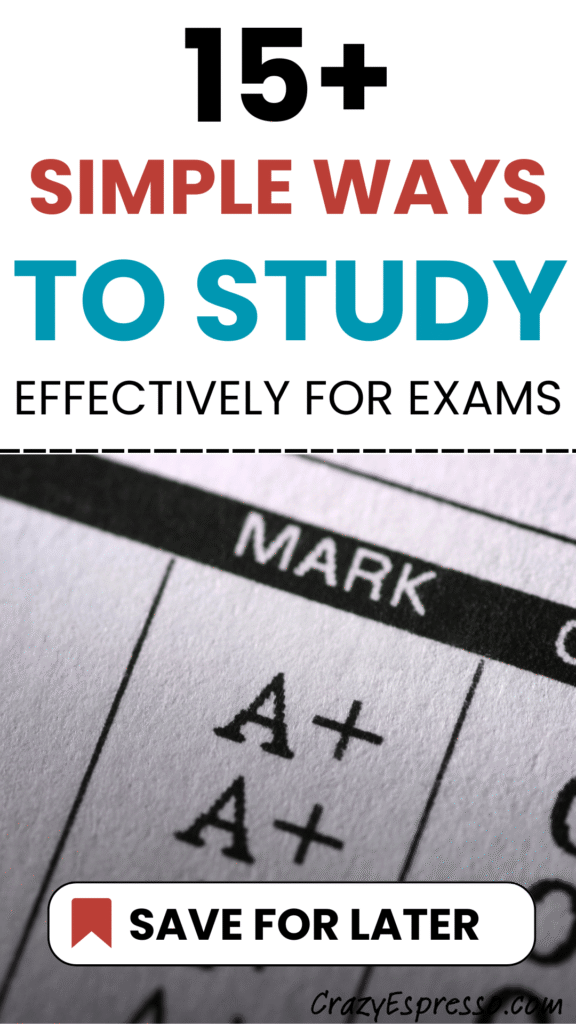Studying for exams can feel overwhelming, especially when time is short or the syllabus is long enough to make anyone anxious. But with the right strategy, you can cut the stress, learn faster, remember better, and walk into the exam room feeling confident instead of confused.
Let’s walk through a practical, easy-to-follow guide that helps you study smarter, not harder. No complicated jargon, no stiff academic language — just real, relatable advice that actually works.

Table of Contents
Why Most Students Struggle During Exam Preparation
Before jumping into the techniques, it helps to understand why studying often becomes difficult. Once you know the common obstacles, you can avoid them easily.
Common Reasons Students Struggle
- Studying at the last minute
- Not knowing where to start
- Poor time management
- Lack of focus
- Studying without a plan
- Trying to memorize everything
- Distractions (your phone is usually the biggest culprit)
Fixing these issues alone can transform your performance. Now let’s explore the strategies that make studying more effective.
1. Start With a Solid Study Plan 📅
A study plan is your roadmap. It keeps you organized, reduces stress, and ensures that every topic gets proper attention.
How to Create a Simple Study Plan
- List all subjects and chapters
- Highlight important or difficult topics
- Break big subjects into small chunks
- Assign specific days and times
- Add short breaks
- Review progress weekly
Sample Weekly Study Schedule
| Day | Study Tasks | Time Needed |
|---|---|---|
| Monday | Math: Chapters 1–2 review | 2 hours |
| Tuesday | Science: Biology diagrams + notes | 1.5 hours |
| Wednesday | English: Past papers + grammar practice | 2 hours |
| Thursday | Math: Problem solving questions | 2 hours |
| Friday | Science: Chemistry formulas + flashcards | 1.5 hours |
| Saturday | Group discussion + general revision | 2 hours |
| Sunday | Full weekly review + rest | 1 hour |
A schedule like this gives you balance without burnout.
2. Use Active Learning — Not Passive Reading
Reading a chapter again and again is one of the least effective ways to study. Your brain remembers better when you interact with the content.
Try These Active Learning Techniques
- Teach the topic to someone else
- Explain it to yourself out loud
- Create flashcards
- Solve past papers
- Write summaries in your own words
- Make mind maps
- Quiz yourself after every study session
These methods force your brain to think, which deepens memory.
3. Break Your Study Time Into Smaller Sessions ⏱️
Long study hours may look impressive, but they’re not efficient. Short, focused sessions are far better.
The Pomodoro Method
A popular technique that many students love:
- Study for 25 minutes
- Rest for 5 minutes
- After 4 rounds, take a longer 20–30 minute break
Why It Works
- Stops burnout
- Improves focus
- Makes studying feel lighter
- Strengthens concentration over time
4. Choose the Right Study Environment
Your study environment has a huge effect on how well you learn. A clean, calm space can multiply your productivity.
How to Create a Focused Study Space
- Use a comfortable chair
- Keep your table clean
- Reduce noise
- Avoid studying on your bed
- Keep your phone out of reach
- Make sure lighting is bright
Even small changes in your environment can make studying feel easier instantly.
5. Take Handwritten Notes for Better Memory ✍️
We’re surrounded by digital tools, but handwritten notes still work best for long-term memory.
Benefits of Handwritten Notes
- Helps your brain process information
- You remember faster
- Easier to revise later
- More organized
- Can create diagrams, arrows, and highlights freely
Quick Note-Taking Tricks
- Use headings
- Highlight key ideas
- Create bullet points
- Add diagrams
- Keep notes neat and short
6. Use Memory Techniques to Remember Faster
Some topics need memorization — dates, formulas, definitions, vocabulary, laws, and more. Memory tricks help you remember without stress.
Popular Memory Techniques
- Mnemonics: Fun phrases that help memorize information
- Chunking: Break big info into smaller pieces
- Storyboards: Turn facts into small stories
- Visualization: Imagine the concept in your mind
These tricks make even boring topics feel simple.
7. Practice With Past Papers 📘
Past papers are golden. They show you exactly what to expect in the real exam.
Why Past Papers Help
- You understand the question style
- You learn time management
- You can identify weak areas
- You become familiar with tricky questions
- Your confidence grows
Try solving at least one paper every week.
8. Stay Organized With Study Tools
Using simple tools can make studying more enjoyable and less overwhelming.
Helpful Study Tools
- Sticky notes
- Flashcards
- Highlighters
- Timetable apps
- Digital planners
- Whiteboards
- Voice recordings
Organizing your studies keeps your mind clear and improves focus.
9. Avoid Multitasking — It Slows You Down
Many students try to “study while scrolling” or “watch lectures while texting.” But multitasking cuts your learning ability almost in half.
What To Do Instead
- Focus on one subject at a time
- Keep your phone on silent or in another room
- Clear your desk of distractions
- Practice deep work for short bursts
Your brain works best when it focuses on one thing.
10. Revise Consistently — Don’t Cram Last Minute
Revision helps transfer information from short-term to long-term memory.
Easy Revision Plan
- Revise after 24 hours
- Revise again after 3 days
- Revise again after 7 days
- Do monthly revision
This cycle locks the information in your mind.
11. Use Healthy Study Habits 🧠
Studying isn’t just about books — your brain needs the right lifestyle to perform well.
Healthy Habits That Boost Learning
- Sleep 7–8 hours
- Drink enough water
- Eat brain-friendly foods (fruits, nuts, eggs)
- Avoid heavy meals during study
- Take short breaks
- Stretch or walk every hour
Foods That Improve Focus
| Food Type | Benefits |
|---|---|
| Walnuts & almonds | Boost memory and concentration |
| Eggs | Improve brain performance |
| Dark chocolate | Helps alertness |
| Berries | Improve long-term memory |
| Green tea | Calms the mind & increases focus |
These simple habits can improve your energy and attention dramatically.
12. Study According to Your Learning Style
Different people learn in different ways. When you know your style, studying becomes smoother.
Types of Learning Styles
- Visual learners → diagrams, charts, videos
- Auditory learners → listening to notes or lectures
- Reading/writing learners → rewriting notes
- Kinesthetic learners → hands-on activities, movements
Mix the styles based on what suits you.
13. Teach Someone Else — The Ultimate Study Hack
Explaining a topic to someone else is one of the strongest ways to learn.
Why Teaching Works
- Forces you to simplify the topic
- Highlights gaps in your understanding
- Makes the concept clearer
- Improves confidence
Even explaining to yourself in the mirror works wonders.
14. Group Study (Only If Done Right)
Group study can be extremely helpful — but only with the right people.
Benefits
- You learn different ideas
- You stay motivated
- You understand difficult topics faster
- You can quiz each other
Avoid Group Study If
- The group keeps chatting
- Nobody stays focused
- It wastes time instead of saving it
Choose your study partners wisely.
15. Manage Stress Before It Manages You 💆♂️
Exams naturally bring pressure, but too much stress affects memory and focus.
Ways to Reduce Exam Stress
- Do breathing exercises
- Take short walks
- Listen to calming sounds
- Avoid comparing yourself with others
- Stay positive
- Focus on progress, not perfection
A calm mind always learns better.
16. Prepare Your Exam Day Strategy Ahead of Time
Good preparation includes knowing what to do on exam day itself.
Night Before the Exam
- Revise only the key points
- Avoid touching new topics
- Pack your stationery
- Get proper sleep
On Exam Day
- Eat a light meal
- Reach early
- Stay relaxed
- Read the paper carefully
- Answer easy questions first
Having a strategy keeps you steady and focused.
Final Thoughts
Studying effectively isn’t about spending endless hours with your books. It’s about using smart methods, planning your time, taking care of yourself, and staying consistent. When you mix active learning techniques with a calm and organized routine, your exam preparation becomes not only easier but also far more successful.
On your next exam, walk in confidently — because once you understand how to study properly, no subject feels impossible.


